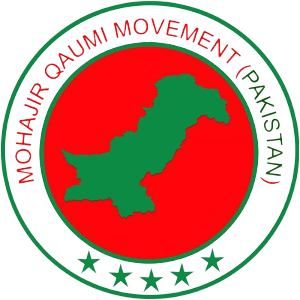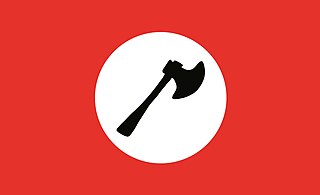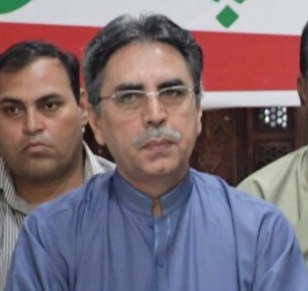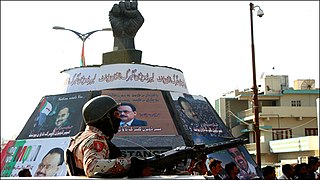
The Muttahida Qaumi Movement (MQM), previously known as Muhajir Qaumi Movement, is a secular political party in Pakistan that was founded by Altaf Hussain in 1984. Currently the party is split between 2 main factions. MQM-London faction is controlled by Altaf Hussain from London, while MQM-Pakistan is run by Khalid Maqbool Siddiqui based in Pakistan. Its electoral symbol was a kite.

Altaf Hussain is a British Pakistani politician who is known as the founder of the Muttahida Qaumi Movement. He holds United Kingdom citizenship and has been living in exile in the UK since the start of Operation Clean-up. Since 2015, he has been a fugitive from the Anti Terrorism Court of Pakistan on the charges of murder, targeted killing, treason, inciting violence and hate speech. He went on trial in the UK in January 2022 for promoting terrorism and unrest through hate speech in Pakistan, and was acquitted the next month. He had fled the country in 1992 after a crackdown against his party was launched.
Qader Magsi is a Pakistani politician from the Sindh Taraqi Pasand Party.

The All Pakistan Muttahida Students Organization is a Pakistani student organization notable for creating a political party: the Muhajir Quami Movement, now called the Muttahida Qaumi Movement (MQM).

Sindh Taraqi Pasand Party is a left-wing Pakistani political party. Dr. Qadir Magsi is the chairman of Sindh Taraqi Pasand Party.

Syed Faisal Ali Subzwari is a Pakistani politician and senior leader of Muttahida Qaumi Movement – Pakistan. He was elected as a member of the Provincial Assembly of Sindh on the ticket of MQM-P in 2013 Pakistani general election and has served as the opposition leader in Sindh Assembly.

Operation Clean-up, also known as Operation Blue Fox, was an armed military intelligence program led by the Sindh Police and Pakistan Rangers, with an additional assistance from the Pakistan Army and its related intelligence agencies. Planned by the FIA, Intelligence Bureau and launched the directives of Prime Minister Nawaz Sharif in 1992, the program was more strictly pursued by upcoming Prime Minister Benazir Bhutto in 1993–1994, as part of her internal policies.

The Mohajir Qaumi Movement Pakistan also known as Mohajir Qaumi Movement (Haqiqi), MQM-Haqiqi is a political party claiming to represent the Mohajir in Sindh, Pakistan whose leader is Afaq Ahmed.

Muttahida Qaumi Movement (Pakistan) (Urdu: متحدہ قومی موومنٹ (پاکستان)Muttahidah Qọ̄mī Mūvmaṅṫ Pākistānabbr.MQM-P) is a social liberal, Muhajir nationalist, and secularist political party. The leader of the party is Khalid Maqbool Siddiqui. The party's symbol is the kite. It is mostly active in Karachi where the majority of Muhajirs currently reside. The party aims to represent the Human rights of Muhajirs in Pakistan through peaceful and democratic struggle. The Party is a splinter faction of Muttahida Qaumi Movement – London.

Afaq Ahmed is a Pakistani politician who is the founder and leader of Muhajir Qaumi Movement (Haqiqi) (MQM-H), a break-away faction of the much larger than Muhajir Qaumi Movement which later became Muttahida Qaumi Movement (MQM).

NA-246 Karachi West-III is a constituency for the National Assembly of Pakistan that encompasses Orangi.
The Qasba–Aligarh massacre was an ethnic massacre that took place when recently settled armed tribals attacked densely populated locals in Qasba Colony, Aligarh Colony and Sector 1-D of Orangi in Karachi in the early hours of the morning on 14 December 1986. According to official reports, around 49 people were killed and several hundred were injured in what was perceived as a "revenge killing" following an unsuccessful raid on a Afghan heroin processing and distribution center in Sohrab Goth by the security forces. Most of the residents of the two colonies happened to be Muhajirs like Biharis who had been freshly repatriated from Bangladesh.

Pak Sarzameen Party was a Pakistani political party founded by Syed Mustafa Kamal and Anis Kaimkhani on 23 March 2016. Ashfaq Mangi, Hassan Sabir, Iftikhar Alam and Shabbir Qaimkhani were senior members of the party. It merged into Muttahida Qaumi Movement – Pakistan on 12 January 2023.

The Jeay Sindh Students’ Federation (JSMM) Sindhi: abbreviated as JSSF JSMM, is the student wing of various separatist organizations struggling for the freedom of Sindhudesh following the ideology of G. M. Syed, founded in 1969. JSSF was a nationalist outfit which emerged from Anti-Unitary System Struggle in the late 1960s and later joined G. M. Syed in his ideology of a separate homeland for Sindhis in 1972. Since then, it has been working as the students’ front of the Jeay Sindh or Sindhudesh movement.

Aamir Khan is a Pakistani politician who is the senior deputy convenor and leader of Muttahida Qaumi Movement – Pakistan.

Iftikhar Akbar Randhawa is a Pakistani Politician. He was senior leader of Muttahida Quami Movement (MQM) until he joined Pak Sarzameen Party.
Pucca Qila Operation was a coordinated operation launched by Sindh Police on the orders PPP led Sindh government against Muhajir protesters and MQM party workers in the Pucca Qila area of Hyderabad city. The operation resulted in the deaths of more than 70 people, including Muhajir men, women and children. The incident resulted in the dismissal of the Benazir Bhutto government by President Ghulam Ishaq Khan, allegedly on the orders of Pakistan army.
MQM militancy refers to militancy in Pakistan associated with the Muttahida Qaumi Movement party.
In between 1972 and 1992, MQM militants launched multiple attacks against the Sindh government and civilians in order to get a stronghold over Karachi. The first insurrection came to an end following Pakistan government's Operation Cleanup conducted in order to destroy the MQM stronghold in Karachi.

The second MQM insurrection referred to an insurrection by MQM, a political and militant organisation representing Muhajir people which launched an insurrection in 1978 against Sindh government as well as multiple other opponents. This insurrection was suppressed by Pakistan army in the Operation Cleanup. In 1994, after the military's withdrawal, MQM launched another wave of anti-state, sectarian and ethnic violence. Its intensity died down following Operation Lyari and Karachi targeted action. The 2015 Nine-Zero raids saw several key MQM leaders arrested and the beginning of a crackdown on the party. Another crackdown in August 22, 2016 saw the closure party headquarters near 90 Azizabad, Khursheed Memorial Hall, MPA Hostel, and Jinnah Park, the arrest of other MQM leaders and "marked the end of the story for the party founder, Altaf." of In 2016 the Muttahida movement began to fragment, seeing the rise of MQM-Pakistan and other breakaway factions like the Pak Sarzameen Party (PSP), MQM-PIB colony and MQM-Bahadurabad factions. The original faction becoming known as MQM-London.














